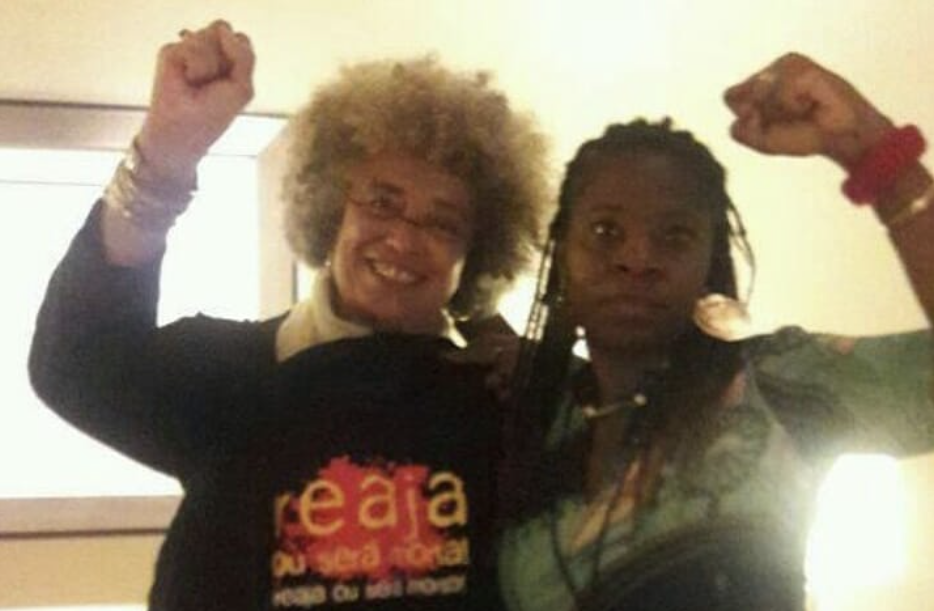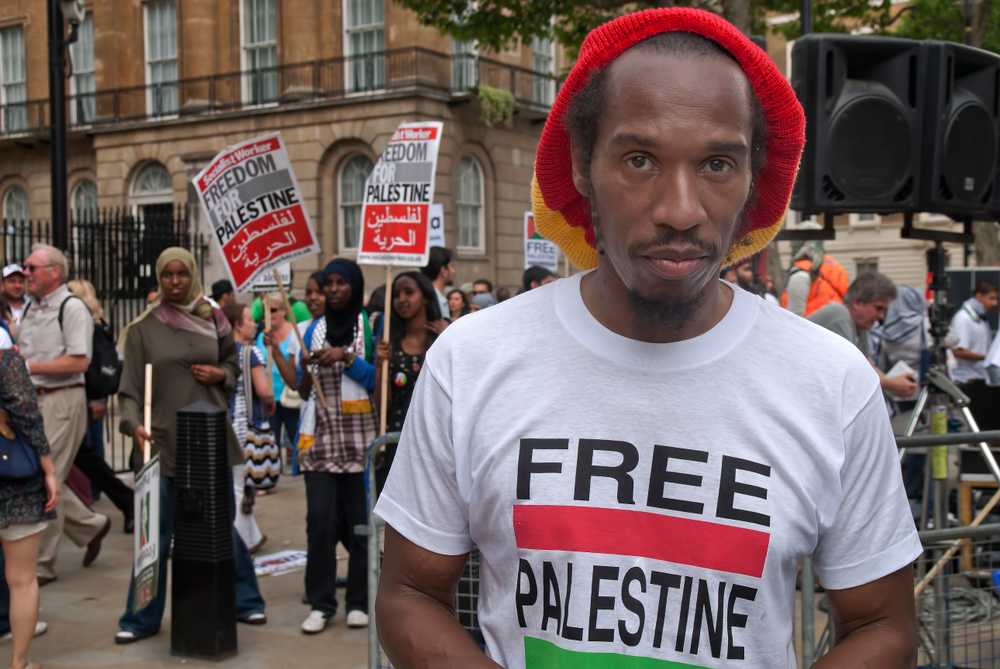Part two of the Atlantic Archives interview with Andréia Beatriz.
AA: Tell us about Reaja ou Será Morta. There are global struggles, but we need to work much harder to connect these struggles and give birth to more transnational victories. What are the most important things African Americans know about Reaja ou Será Morta?
AB: “Reaja ou Será Morta/React or Be Killed” is a political organization that was born in 2005 as a campaign to confront the genocide of Black people. It started with a campaign and a series of actions to denounce the state practices of racism and anti-Blackness by mobilizing people and teaching them to organize in the face of this context.
Over time, we understand that many organizations stopped promoting the campaign for other interests, but we kept a core group and recently in 2016 we became a political organization. We created a quilombismo community school, Winnie Madikizela Mandela, here in the neighborhood of Engenho Velho de Brotas in Salvador.
The Winnie Mandela school is an educational center, a community formation center that aims to prepare the youth from the neighborhood to organize themselves in different ways, through political organizing, understanding their history as Africans in the world, physical health, martial arts and language study. This curriculum is an opportunity to reinforce the formal education process of public schools which are very outdated. We understand the need to redress this educational process until we are able to have our own schools.
AA: The organization also publishes literature, right?
AB: Yes, we also inaugurated a publishing house to promote our point of view to the world. We published the biography of Lumumba and Assata Shakur, as well as books by activists and people who lack access to mainstream publishers whose racial selectivity benefits white authors and punishes Black authors. So, we understand that this is part of a series of necessary actions to tell our story and also allow us to get to know authors, poets and Black writers who can produce from our perspective.
In addition, “Reaja/React” are members of the IV Internacional Garveista, a pan African movement, where we present our struggle nationally and internationally. We understand there are Africans around the world fighting back and it’s necessary that we work together. It’s not an easy move, because we’re going against the grain of funded activism and we’re trying to organize ourselves autonomously, independently…
AA: What is it like working at the grassroots level in Brazil?
AB: Fundamentally, the most important thing about having a formation center in a Black neighborhood is being able to promote political and community actions. We also have a community library so people can have access to books, productions and meeting places where we meet to strategize among ourselves to discuss our problems and to also seek alternatives through the literature.
We have a permanent project within the prison system called “Cultura e Saúde Intramturos/Culture and Health Between the Walls”.
These two dimensions of our life, which need critical advocacy within our personal and community lives, need even more attention within prisons. We also address the needs of family members, the other victims of the Brazilian racist state – most of them are mothers . There are parents who lost their children to this process of brutality, violence from the police. It is critical to recognize the impact of this on the lives of these families. There are mothers who go into depression, fathers who break up families, brothers, who in the face of violence, police brutality, when the police invade their communities, the neighborhoods where we live, when the police make arbitrary and violent approaches that leave disrupt people’s lives.

We seek to organize ourselves and fight from a legal point of view, seeking the right to emotional, structural, and financial support for victims to repair their lives from this brutality.
One of the most important cases that we work on and that we continue to follow was a case that happened in 2015 when the military police of the state of Bahia invaded the neighborhood of Salvador called Vila Moisés and with this invasion they left 12 young Black people brutally dead, murdered with violence according to the autopsies- with fractures, violence and classic signs of execution. And from there, the secretary of public security at the time, Maurício Telles Barbosa – who was recently exonerated after being accused of involvement in selling sentences along with other judges and other public servants – presented the version that was supported by the state governor, that these young people were preparing to carry out a robbery at a bank branch and that there was an exchange of fire.
We immediately mobilized and the Public Ministry itself understood that there was none of this according to their expertise, pointed out that there was an execution and there was an ambush set up by the state. The governor never recanted, even on the day of the event, the governor of the state of Bahia, Ruy Costa, stated that the police officer is “like a soccer player in front of the goal” (meaning his job is to strike automatically), comparing the lives of these young people, these families as if it were a game- a joke.
He never retracted his statement and the process still runs until today. After several irregularities within the investigation, it turns out that nine police officers were involved but there has not been a conviction yet.
So, this is one of our most important actions- unmasking the state and the state’s security forces. Especially the military police of the state of Bahia, which has been one of the instruments used to maintain the violence and this status quo of white society, protected by their police created with the mission of fighting Black movements.
But, in the face of all this, I consider that the most important thing we do are the dialogues with young people in the neighborhood where the Winnie Mandela center is located. We discuss strategies on various topics: Black political history, health, mental health, Black literature, debates and important discussions for our community, and the reorientation of our future.
AA: The work of my organization, Atlantic Archives, tries to use working-class dialogues to express the importance of transnational identities and politics. Among my social sphere, I often list the common medical issues, environmental, law enforcement, and various other traumas- that we both are fighting against. I believe this proves that we have more in common with “Southern American” relatives than we do with those we share citizenship with. But it is difficult for us to surmount coloniality and language so we remain unlocked and separated when we should be together.
AB: From the point of view of our organization, there are peculiarities of African people in the world, whether they are on the African continent, whether they are in Europe, Asia, Oceania or the Americas. We understand one of the big questions is why are we seeking integration with white people who don’t care about us, who don’t want our presence, who do everything to exclude us, who do everything to keep us in a cycle of vulnerability, of exclusion, death and feed this cycle – or are we are interested in seeking our own independence. So this is fundamental for us at “Reaja/React”, this is the search that we do and we understand that we can build from our own lives, from our practice, from what we face as anti-black racial hatred.
AA: This transnational strategy is fundamental to the philosophies of Afro Brazilian Black Movements but much less so for modern Black movements in the United States.
AB: It’s very difficult to say, but in the transnational dialogues that we have, we make this very explicit and we do all the exercise to seek practices that reinforce this autonomous, collective construction, which we understand to be more important than an integration process. In the little experience that we have in other locations, what we see in some aspects is the effort of certain groups of people to integrate themselves into a society that rejects, that rejects us all the time, so this may be an important point to be discussed. To be reflected on together. How can we oppose this system but without losing our autonomy.? Not in search of integration but in search of reinforcement of who we are in the world, of our identity and to recognize that there are differences and that for us this was never the problem.
AA: How do you think AfroBrazilians might teach and encourage African Americans to understand the political and cultural importance of the majority Black population in Brazil and what future can be made?
AB: One thing that we also discuss is the role of Black women in this struggle. We have a fundamental role of reorganization, of structuring- but at the same time that we give life, we don’t abandon these lives. We are on the front lines of the prison units visiting the police stations. On the street. In informal work. Supporting Black families, and then we understand that all oppression, all anti-racial hatred, happens in different ways.
Black women have experienced all this brutality differently, precisely because of this fundamental role. And we understand that we live a continuation of colonization, not the end of a process but as a cycle and the beginning of new processes. Plantation slavery formally ended- theoretically we no longer live it but everything that happened consequent to it was reinvented into new instruments to violate and deny our humanity
When we look for references like Winnie Mandela, Assata Shakur, they are women we understand who led struggles. Assata Shakur, who is a fundamental woman in the Black movement in the USA and in the world, is an important reference.
I was recently at a meeting with Black women who live in Europe, in Lisbon, and we discussed exactly this. Everything that impacts our lives and how women actually feel the impact of this violence. Of all this denial of humanity. Of all this brutality that affects Black people. Black communities. Black families and reaches the bodies of Black women.
We would like to thank Andrea for her time and insight. You can support The WInnie Mandela School and Reaja ou Será Morta through their social media.
Translation services provided by:








